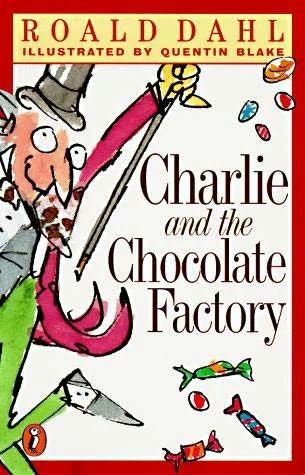 |
| Alfred A. Knopf |
Oh, I've shared similar realizations after watching both the 1971 film with Gene Wilder and the 2005 remake with Johnny Depp. Wilder captures a darker side of Wonka, emulating his flagrant disregard for safety - and, let's be honest, the lives of his guests - while Depp portrays a particularly loony side of the renowned chocolate-maker. After watching (and re-watching) the movies, I think it's safe to say that I know Willy Wonka is positively batty.
I love that he vacillates between sardonic and manic and pleasant and grim and silly. There's something about him that's immediately intriguing, like he's having a laugh at the world but the world doesn't quite know it, like he has a secret to share and only those closest to him can be privy to such information. Truthfully, I like Wonka for his eccentricities. He's entirely crazy (or, at the very least, brilliantly unhinged), but that's what makes him interesting.
However, I never realized that Willy Wonka seems almost predatory.
I don't know if predatory is exactly the right word - criminally negligent, possibly? Callous? Careless? - but I find it does fit in some capacity because, you see, Wonka (and his Oompa-Loompa work force) is rather terrifying. I mean, think about it: Wonka has lured children and their parents to his chocolate factory, secluding them from the rest of the world, systematically playing upon their faults and weeding out the weak, greedy, irresponsible and stupid. He isn't just some silly inventor of candies and sweet treats; he's an evil mastermind who preys upon other people.
And he's done it more than once.
After Augustus Gloop falls into the chocolate river and, subsequently, gets sucked up a tube to the Fudge Room, he tells his remaining guests not to worry: "And please don't worry about Augustus Gloop. He's bound to come out in the wash. They always do."
They? This has happened in the past? Is no one else alarmed or, at least, discomfited by the notion that this has happened before? I mean, Wonka could merely be referring to stains in general, using a vague "they" to refer to chocolate stains (working with chocolate every day must make him a bit of an expert on stain removal), or he could be implying that Augustus Gloop is a stain and he'll be forever changed after his experiences at the chocolate factory.
But, honestly, I find it more likely that Wonka actually means what he says. (I'm guessing the poor Oompa-Loompas have gotten the raw in the deal seeing as how they're always his guinea pigs. Honestly, he's probably referring to one of the Oompa-Loompas falling into the river and coming out clean later. It wouldn't surprise me.)
And let's not forget Violet Beauregard, the girl who gets turned into a blueberry. I'm not going to lie and say she didn't deserve it: she did seeing as how Wonka clearly told her not to eat the gum and then she proceeded to disregard all advice contrary to her own desires. However, I was a little perturbed by the little ditty that the Oompa-Loompas sang:
"And that is why we'll try so hardFirst, they sing a song about Miss Bigelow, a lady who chews so much gum and chews so ferociously that she finally chews off her own tongue and, eventually, loses her mind; next, they sing about Violet in the hopes that things go well because, you know, it's entirely possible that she might just die from her unusual condition.
To save Miss Violet Beauregard
From suffering an equal fate.
She's still quite young. It's not too late,
Provided she survives the cure.
We hope she does. We can't be sure."
I suppose what makes it worse is the short exchange between Willie Wonka and Violet Beauregard during their trip to the Inventing Room:
"They passed a yellow door on which it said: storeroom number 77--all the beans, cacao beans, coffee beans, jelly beans, and has beans.
"'Has beans?' cried Violet Beauregard.
"'You're one yourself!' said Mr. Wonka."In the movies, you get the sense that Willy Wonka knows more than he's telling, he knows much more than he's letting on that he knows; however, you never really know for sure. He either cleverly hides behind a veil of sarcasm or disregards the notion entirely, but, in the book, I find it highly unlikely he doesn't know what has and will happen in his chocolate factory. I mean, Wonka is probably just insulting Violet when he calls her a "has been," but I can't get over how it foreshadows events in the future.
That's why I used the word predatory, because it's entirely possible that he's a patient, meticulous planner who manages to not only predict his guests behaviors but to create individualized traps to ensnare them. Subsequently, that's also why I called him a compete and utter psychopath.
Why on earth did I ever wait to read Charlie and the Chocolate Factory?
No comments:
Post a Comment